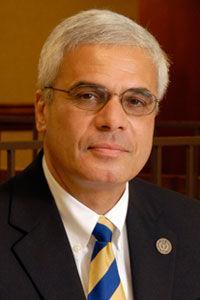The new commissioner of higher education, Joseph Rallo, brings experience to Louisiana from a variety of places.
He comes to Louisiana after 27 years of service in the military and as a member of the Board of Trustees for the Southern Association of Colleges and Schools Commission on Colleges — the University’s accrediting body. He also served as president of Angelo State University for five years, and most recently as special adviser for global engagement at Texas Tech University.
Rallo will start as the state’s eighth commissioner of higher education in early January, serving as the lead coordinator of the state’s four higher education institutions and working with the state legislature and the Louisiana Board of Regents to navigate higher education policy.
Rallo has a bachelor’s degree in Russian history and a law degree from Western New England University and a Ph.D in international relations from Syracuse University. He retired from the U.S. Air Force with the rank of Colonel.
“I don’t expect surprises because I’ve seen, in the military world, most things,” Rallo said. “I have been around seven or eight different institutions, and it’s good to be able to compare, to say we did this in Colorado, we did this in Michigan or we did this in Texas. It may not be the right answer for Louisiana, but it gives you something else to think about.”
Rallo comes to the state after years of declining higher education funding and hopes to help stabilize the amount of money higher education receives from the state, so each institution knows what it will have in the future.
He said he wants to make sure the state’s programs allow students to compete in the economy after graduation.
“We need to have the rigor that’s necessary to make sure that [students] are successful,” Rallo said. “We need to make sure that your degree programs allow you to be competitive with other students whether they are from Texas or Taiwan.”
Rallo said he wants to continue the momentum the leaders of the LSU, University of Louisiana, Southern University and Louisiana Community and Technical College systems have built working toward goals like increasing funds for higher education.
“I’m a believer that if you have four systems working together and speaking together you have much more clout and opportunity within the legislature and other venues than you would if everyone was off alone,” Rallo said.
In August, LSU President F. King Alexander said in past years the state leaders in higher education were often acting as competitors rather than teammates while working to accomplish goals.
“I met with the leadership. I think everyone understands the need for coordination and a willingness to work together toward common goals,” Rallo said. “There will be disagreements, there always are, but if you get to the bottom of it, we’re all interested in educating people.”
This year the WISE Fund bill passed, giving $40 million more to higher education. The $40 million was distributed among the four systems, giving the LSU system roughly $14 million to put toward producing graduates equipped for the jobs with the most need.
“We’re only in the first year of using those WISE dollars, we need to make sure the allocations are appropriate, and to make sure the outcomes that are desired for those appropriations are achieved,” Rallo said.
New Commissioner of Higher Education brings experience to position
October 13, 2014

Joseph Rallo will serve as Louisiana’s new commissioner of higher education.
More to Discover









